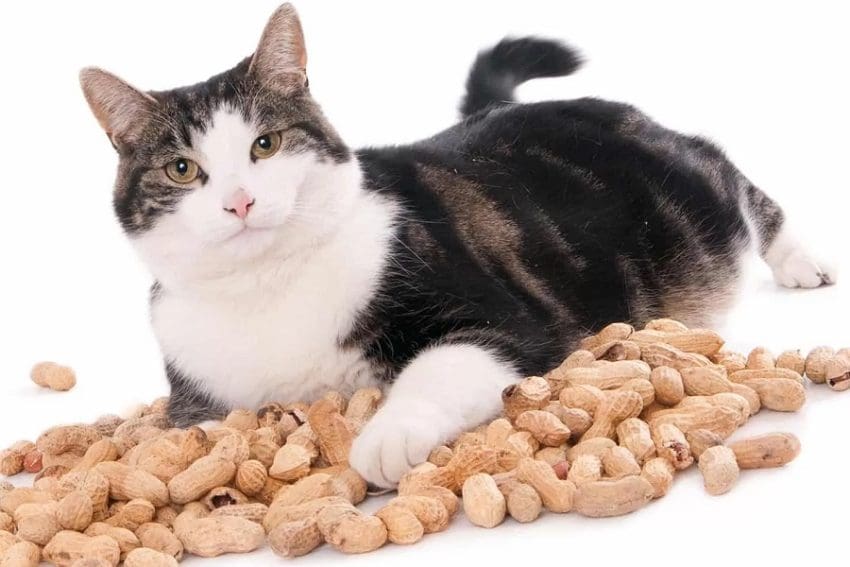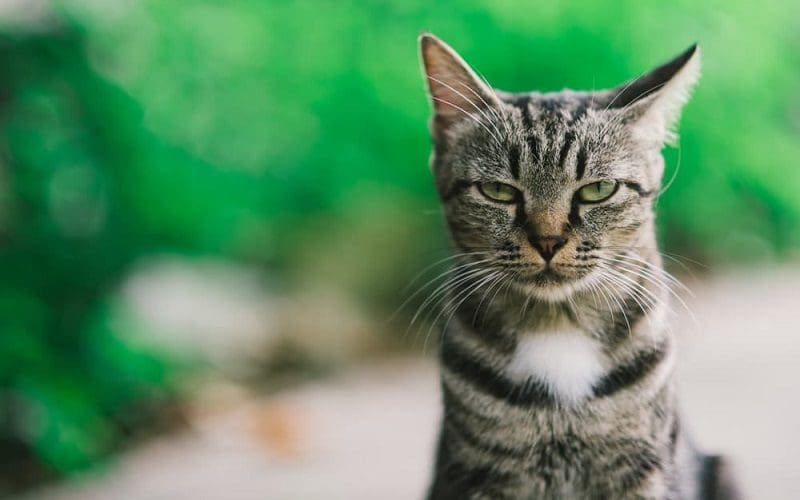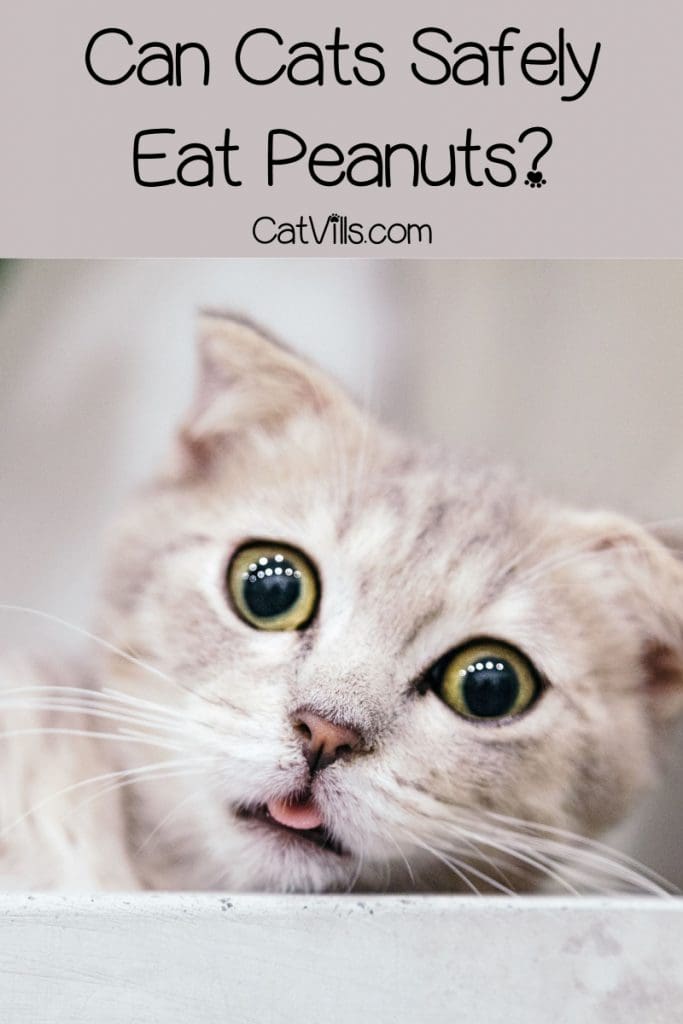Last Updated: 1 year ago
Is it okay to give peanuts to your cat?
It’s a valid concern, especially for those with cats who act like dogs and eat everything in sight!
Let’s take a look and find out can cats eat peanuts and whether they should, since those are two very different things!
Is It Safe To Give Peanuts To Your Cat?

If you have house cats, you know they are finicky animals.
They tend to be creatures of habit. They like their routine and do not handle change very well.
But maybe you are something of a ‘foodie’ and always have various plates of goodies around.
And what if you have an adventurous cat? One with a “try anything once” outlook on snacks?
What if your cat is regularly up on the counters, snooping around your dinner party plates?
You may end up constantly looking up articles on what is safe (and what is not) for cats to eat.
Your browser history could be full of search results about animals eating human foods.
Can Cats Even Eat Peanuts?
Technically, yes. Cats can eat nuts. A cat is able to chew, swallow, and digest a peanut or two.
They are not poisonous or dangerous for your cat to eat. Peanuts even have a lot of protein, which is great for your pet.
Cats are carnivores and exclusively use protein for energy and to support every single biological process their body needs to survive.
Humans and many other animals use carbohydrates or even fats, but cats need amino acids from meat.
But even with their high protein content, peanuts may not be the best choice for snack sharing with your kitty.
For instance, you have to be careful with how much fat is in nuts. Excess fat could cause digestive upset for your feline friend.
Potential Health Risks

Nausea, vomiting, and diarrhea could pose huge risks for your housecat, including dehydration and choking.
Some nuts are also roasted in oils (contributing to a higher fat content) and salted. Too much salt can be dangerous! If your cat is constantly chugging water, he has likely had too much sodium in his diet.
The worst-case scenario resulting from too much salt is a condition called sodium ion poisoning, or hypernatremia. Watch for seizures, elevated body temperatures, and stomach issues.
Peanuts still in the shell are the biggest threat. Those crispy little shells may look edible, but in fact, they can splinter and create shards that could pierce your cat’s esophagus or digestive tract.
A whole peanut in the shell could be a fun toy, though! Watching your kitten bat it around will likely be more exciting than watching her try to eat the nuts inside.
If your cat enjoys snacking on peanuts with you, make sure they are raw and unsalted. Limit his consumption to just a couple nuts at a time.
As always, be vigilant when giving your pet new food. Watch them carefully for signs of a negative reaction. Cats can be allergic to peanuts just like humans can!
How To Safely Feed Your Pet

High quality cat food, whether wet or dry, is absolutely the best source of complete nutrition for your furry babies. Your pets can have lots of human foods to taste, though!
Cats and dogs can both enjoy small bites of peanut butter if peanuts are not on the menu at your house.
Spoonfuls of pure nut butters like almond butter (in moderation, and with no added sugars or oils) are actually frequently suggested by veterinarian offices as clever hiding places for medicine!
Whole grains like oatmeal and rice, thoroughly cooked, unseasoned meat and fish, and fresh fruits and vegetables (peas, pumpkin, and spinach are often found in commercial pet food for a reason!) are all healthy for your pet to nibble on.
Despite cats being carnivores by nature, it is best to avoid giving them raw meat. The chances of them contracting salmonella, a bacteria found in raw meat and eggs that could be deadly, are too great.
It is also worth noting that, despite the stereotype that kittens drink out of bowls of cream, most cats are lactose intolerant.
In nature, cats only drink milk from their mother for a few weeks, and they certainly don’t go and buy a wheel of good-quality aged Parmesan. Dairy products made from cow’s milk can make people quite ill.
Onions and garlic, raisins and grapes, and anything with alcohol, chocolate, or caffeine are not safe for dogs and cats to munch on.
Any added sugar, especially substitutes like xylitol, can be very dangerous.
Wrap-Up
It is probably best to avoid giving your tired pet a sip of your morning latte!
Always check with your vet before supplementing your pet’s diet with human foods, and watch carefully for any signs of an allergic response.
If you notice any abrupt changes to your cat’s behavior or physical appearance, call the vet.
If you share snack time with your pets, stick to small bites of safe food or buy some treats specifically for them. Their happy (non gassy) bellies will appreciate the gesture!
Do you give peanuts to your cat? Does he like them? Share your thoughts below!
Resources:


I had never even considered giving a peanut to a cat. I do remember my cat growing up stealing a bite/lick of my dad’s PB & J though. I had thought it was weird at the time but wrote it off as the cat was curious. I knew they could have allergies as well as being diabetic. We actually found out animals could be diabetic after my dad’s dog became one.
This is certainly great info for people with cats! It’s so important to feed them what is healthiest and safe!
I have one cat that loves peanut butter. Can smell it a mile away? I give her a small amount to lick off my finger as an occasional treat.